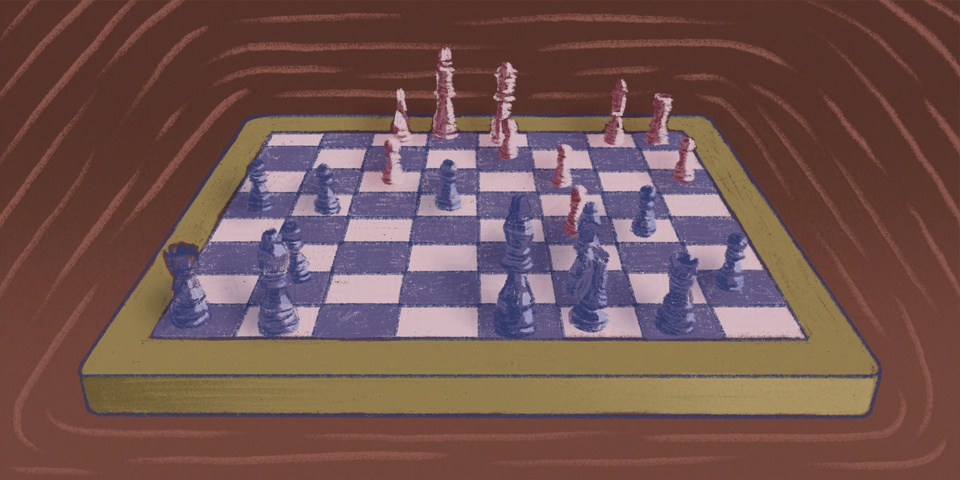Ego and the allure of cheating to win

Whenever I think of the word 'ego,' I think of the words "cheat to win." I first heard this connection from a YouTube spiritual teacher called Matt Kahn. I don't watch his videos anymore as I have become generally suspicious of guru-types, but this nugget of wisdom stuck.
Ego tries to take charge a thousand times each day - sometimes in very subtle ways.
I'll provide an example of ego coming up in my life recently. It doesn't paint me in the best light, but the ego never does. I'm a member at a community printmaking studio, one that I love dearly. The other day, I made the decision to not move a squeegee back from the sink to it's storage rack. To the outside observer, it would just look like I forgot to put the squeegee away. But reflecting on my thought process, I see that I was letting ego steer the ship!

The narrative in my head was that if I put it back, someone else would be more likely to use it. If someone else uses it, they might not clean it thoroughly, and then I'll have a worse printing experience when I go to use it in a couple of days. Instead of trusting that my fellow community members would treat our shared resources with care, the ego told me that the squeegee was a scarce resource that I need to protect via a little loophole known as 'leave it in the wrong spot.' Reflecting on it now, I know that this is not how my highest self would have handled the situation. Although this action was ultimately harmless, I think it's important to question our motivations, even for small actions, if we want to show up for the people we care about in a reciprocal way.
Because of the ego's "cheat-to-win" attitude, it sometimes compels us to alter the stories we tell in order to paint ourselves in a better light. Ego has a couple of sidekicks known as shame and guilt. Shame and guilt can motivate us to hide the parts of ourselves that we find unpalatable as a means of protection.
I had an experience recently in which a friend was asked why another friend was no longer speaking to them. In the moment, while they were telling the story, it was very clear that they were playing dumb, spinning a narrative of, 'I don't know why this happened.' They thought that pretending they weren't responsible would paint them in a better light. Everyone in the room could see right through it.
I have compassion for this friend. They were acting from a place of shame and guilt. However, if my friend had been honest about what happened, it may have been an opportunity for the rest of the group to hold space for their difficult emotions, which could have brought us all closer. Instead, it eroded trust by demonstrating that they don't trust the people who care about them to accept them as they truly are.
When we allow our actions to be motivated by ego, it robs us of our opportunities for intimacy and creates isolation. Loneliness and isolation are more prevalent than they've ever been. People are replacing their friends with AI chatbots because they are unwilling to risk the potential rejection of being vulnerable with real humans.
There is no clearer example of the cheat-to-win mentality than the rapid growth of AI. Companies with CEOs stuck in ego think, 'if I can just implement more AI features faster, I'll outpace my competitors.' It's not about what the customers actually want or what's sustainable; it's an ego race. They set aside the fact that AI is consuming our children's drinking water because they are blinded by the quest for profit.
Creators using AI are also thinking in cheat-to-win terms - letting ai do their thinking for them, their writing for them, making their 'art' for them. I can see the appeal. Working more quickly and efficiently can lead to more revenue - a tangible benefit! But creativity is not, at its core, about revenue or efficiency. The joy of making is in the process: the experimentation, the mishaps, the breakthroughs. Do we really need to be more efficient with our art-making so we can have more time to scroll? Or would we rather be efficient with our scrolling so we can have more time to create?
Everyone on the planet has an ego - some big, obvious, throwing tantrums and stomping around; others subtly motivating our small everyday actions. We are all people making imperfect choices - sometimes at the whim of the ego and hopefully often, operating from the wiser self who knows that resources are abundant and we are capable of problem-solving in a healthy way.
Recognizing the role of ego in your life is a learnable skill. Next time you feel cheat-to-win thinking come up, ask yourself:
- what am I feeling that's inspiring this course of action? Fear? Scarcity? Shame?
- how would I act if those feelings weren't true and I knew that the outcome would be positive?
- how might I cope if the worst case scenario did happen, knowing that I acted in integrity?
If you're feeling frisky, take these questions to your journal! The ego famously hates journaling, and though we are not at war with the ego, we can thwart it's tendencies to sabotage us by taking time to reflect.
I wrote this post as part of October 2025's #indieWebCarnival. The prompt is "ego" - here's the full prompt if you'd like to participate!


Member discussion